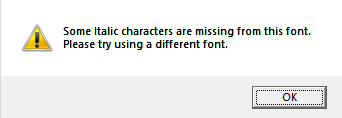Bold & italic
PDF Pro 2 includes buttons to switch between normal, bold and italic versions of a font. PDF Pro 2 can, in some cases, simulate the effect required if the appropriate font is not available.
Actual Bold
- Choose the Text tool
 from the toolbar and select the text you wish to change.
from the toolbar and select the text you wish to change.
Alternatively, choose the Object tool and click on the text box you wish to change.
and click on the text box you wish to change. - Press the Bold button
 or (if using the Text tool only), press Ctrl+B on your keyboard.
or (if using the Text tool only), press Ctrl+B on your keyboard.
If an actual bold version of the font is available in the PDF or on your computer's system, PDF Pro 2 switches fonts. For example, Arial becomes Arial Bold.
Simulated Bold
If bold versions of the selected characters are not available in the PDF or in your computer's system, PDF Pro 2 will simulate bold by overprinting the characters.
The simulated bold text below is written using Juice ITC which has no bold equivalent in the PDF or on disc.

It is clear to see in this example that PDF Pro 2 overprints the text to simulate the bold effect.
The font name will not change in the toolbar despite the fact that the bold button will be depressed. This is indicative of a simulated bold effect.
Simulated bold is never as good as the real thing. But depending on the style of the font, it can be effective when there is no other choice.
Italic
PDF Pro 2 cannot simulate italic text in the way that it can bold text. If the italic version of the selected text is not available in the PDF or on disc, then PDF Pro 2 will show this warning:

Notes
- When editing starts, PDF Pro 2 scans for overprinted text and classifies it as bold. This behaviour can be disabled if it is taking too long or wrongly classifying text – see Advanced Settings.
- Bold text cannot be undone if the plain font is not available, unless it was previously simulated bold.
